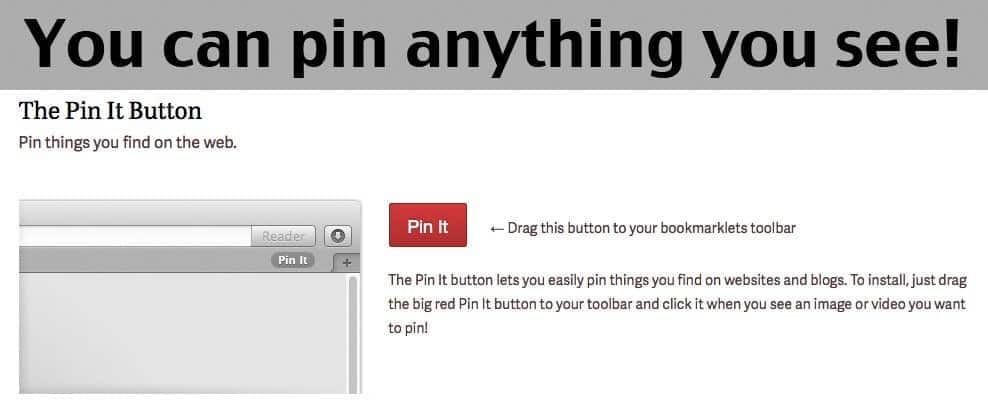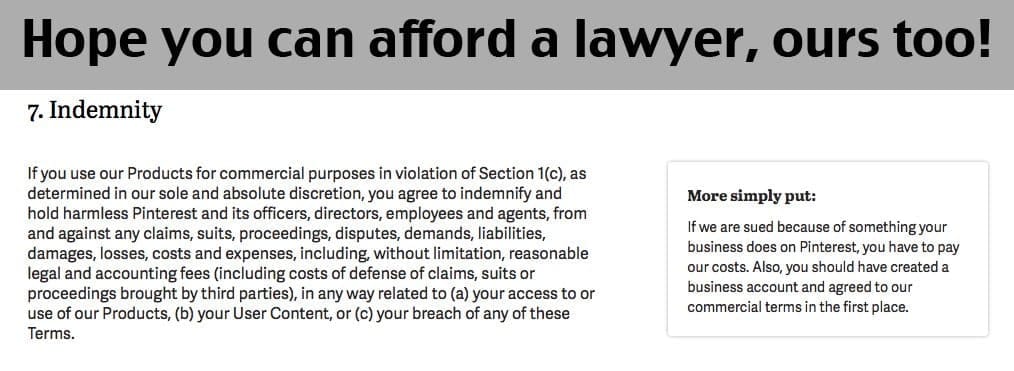Pinterest Ultimately Needs A Re-Think
I purposefully waited to post what are more or less my closing thoughts on Pinterest. I had a mission to complete before this day came…
If you’re curious about what came before, you can see a little of my evolution on thoughts about the social bookmarking service by reading my past posts on Pinterest.
Pinterest – it’s not me, it’s you…
My initial feelings about Pinterest were fairly positive. Since then, the idea of connecting with people who appreciate visual art has given way to the reality that the site is not being used that way very often. I find the service more akin to people collecting trading cards. Were that it was just the casual collectors. Beyond them, there are some genuinely bad eggs, and, well, I never found Pinterest brought measureable traffic to my site, and in the end, it proved to be a source of irritation more than a connection with anyone genuinely interested in what I’m doing.
The final straw ironically came with the move of my portfolio to a new gallery on an entirely different domain. It wasn’t a move I took lightly. I even spent a good deal of time setting up 301 redirects from the old gallery to the new one. For the non-techie folks, this is in essence like giving the post office a permanent change of address when you move. It’s the official way to give the address for your new home on the web. And as someone with some tech skills, it was still a pain to set it up right. When it was finally working, you would think all done, right?
Well, weeks later, I noticed that if I clicked on anything on Pinterest that linked to my old gallery, Pinterest delivered a message that it was redirecting in a suspicious way and possibly quite spammy and surely you would never want to go there? Who would ever click through the warning messages? Suddenly anything from my old site that was on Pinterest essentially took potential viewers nowhere…
I sent a message to Pinterest support that involved a back and forth exchange with them that went on for days. They initially promised to add an exception for my redirects so that users would not get that message. The thing was it never happened. The same danger, danger message continued for any links to my old site forwarded to the new one. I finally threw in the towel months ago and closed out the support request.
Thus began a quiet crusade that I didn’t want to post publicly until it was done. One by one, I went through each pin I could find that was credited to my old site and filed a DMCA removal request for each of them.
For the people who got messages from Pinterest informing them that the copyright owner had requested the content be removed, I’m sorry for the hassle, There was just too many pins and re-pins to individually ask each person out there to fix the links. I would still be doing it. It’s not my fault, please cast your glares at Pinterest for not having a way to resolve the problem.
I’ve also added the nopin code to all the sites where I have that option. The vague chance of connecting with people who are seriously interested is just not worth the hassle of allowing pinning for me, I’m afraid. I hope it doesn’t stop those of you who want to create an old school bookmark or a regular share via Facebook, Twitter, or a good old-fashioned email, but Pinterest is no longer on my good side after that experience. I already had misgivings, but that was where the wagon broke down for me.
How Could Pinterest Be Better?
That’s what I really had in mind when I started this post but it took a little bit to set up how we got here. A couple of things, first Pinterest needs to be an opt-in not opt-out system. Their assumption that all of the content on the web is free to use as content for their site is a raw deal in my opinion. In fact, this assumption is part of an incredibly mixed message that Pinterest provides if you poke through their site enough.
For instance there’s this message, use our tool to bookmark anything you find online!
 Well, you know, except for the content you don’t have a right to pin…
Well, you know, except for the content you don’t have a right to pin…
 And then there’s the kicker, if someone ever decides to include Pinterest in a lawsuit about something you posted, you’re agreeing to pay your legal fees as well as theirs…
And then there’s the kicker, if someone ever decides to include Pinterest in a lawsuit about something you posted, you’re agreeing to pay your legal fees as well as theirs…
 Now, hopefully it rarely escalates to that point, but it’s a little bit of liability that I don’t think the average user realizes they agreed to when they joined such a fun site where they could pin anything they see! Because the message that’s loud and in front of you is pin it all, but buried in the user agreements that most of us never read, it tells a different story. I know, it says commercial use, but it also says it’s their sole discretion what constitutes such use… And regardless of that clause, you’re still left open for a lawsuit if you happen to pin the wrong person’s content.
Now, hopefully it rarely escalates to that point, but it’s a little bit of liability that I don’t think the average user realizes they agreed to when they joined such a fun site where they could pin anything they see! Because the message that’s loud and in front of you is pin it all, but buried in the user agreements that most of us never read, it tells a different story. I know, it says commercial use, but it also says it’s their sole discretion what constitutes such use… And regardless of that clause, you’re still left open for a lawsuit if you happen to pin the wrong person’s content.
This little bit of information has been published and ignored many times over, but the reason I point it out is that an opt-in system takes away that liability. If I agree to allow Pinterest to consume my media, then the users aren’t left holding the bag for potential lawsuits. Sure, it’s less sexy to say use our visual bookmarking system on any page where you find the Pinterst button, but it’s a lot more honest than saying bookmark anything but throwing your users under the bus if someone sues.
And I would take the opt-in system a step further, put in a content management system that lets content owners stay in control of their content. Pinterest already provides a system to allow you to confirm your site belongs to you. Afterward, you should be able to remove content, change links, etc. This would have resolved my problem. Their current system assumes a very static internet. The internet by comparison is very dynamic, content is added and removed all the time and even if a website doesn’t change domains like I did, they still often make changes to the structure of their sites. I wonder how much content on Pinterest points properly anywhere after it’s been on there months or years? And what value ultimately is there to a visual bookmarking system if eventually most of the content is orphaned?
I also think the above point is where I think Pinterest loses a fair use argument like Google uses. Google indexes the web, including our images. There was in fact a court case over the thumbnails Google generates and Google won based on fair use. The idea was that ultimately creating those thumbnails is beneficial as part of a service that indexes the web.
The thing is if I ever remove that content, Google will eventually update their index and remove my content from their results. By comparison, Pinterest houses my content (in the largest size available no less), hypothetically as a visual bookmark, but if the link is broken, Pinterest never removes that content or updates the links. I’m not a lawyer and it would ultimately take a court to determine if this qualifies as fair use, but the very fact that every day more content becomes disassociated from its origin seems to me to undermine a fair use claim similar to what Google has established. And it’s ultimately a system that by its design constantly accumulates more broken links every day.
Not only are some links broken by a dynamic internet, some are intentionally broken. My last wish as a site owner and content creator would be that Pinterest links could not be changed by anyone other than the content owner. I have found too many pins of my artwork that initially went to my site that unscrupulous users have changed to point to something they are selling. I know there are a few large sites like Flickr who have an attribution system that enforces links back with Pinterest, but it doesn’t do much for the little guy and is all about placating the larger sites that could potentially cost Pinterest a lot of their content if they decided to opt-out en masse.
Full disclosure, for now I haven’t entirely shut down my Pinterest account. But I don’t use it much and I’m very selective about what I do post. I post a small selection of my own Zazzle products because I think honestly that if someone pins a pillow, they are probably interested in the pillow and not collecting photos of X location or subject. And I post content from the odd blog, usually DIY type stuff, where I know the blog owner is actively pinning their content, i.e. I’m quite certain they endorse their content appearing on pinterest. You’ll find the net narrows considerably when you apply that requirement. And FYI, don’t assume the simple presence of a pinit button means the original artist approves. Some sites like Zazzle and Etsy do not allow the artists to disable sharing on Pinterest.
I honestly don’t expect any of my demands to be met anytime soon. But maybe there’s a brainiac web entrepreneur out there in the wings looking to create the next Pinterest, a visual bookmarking site that would actually work with content owners instead of simply casting a huge net into the sea and grabbing as much content as possible, all the while shedding any responsibility. And that’s essentially how Pinterest operates. They create no content. They rely on users to “find” content and post it and then they rely on those same users to ultimately deal with any legal issues that may arise. Sweet deal!
And since I don’t see any change on the horizon, I also don’t foresee posting any more on the subject of Pinterest.

Thanks for reading!
If you’ve found my content helpful, insightful, or simply enjoyable, please consider supporting me with a Ko-Fi donation. Your generosity helps me continue creating valuable content. Thank you for your support!